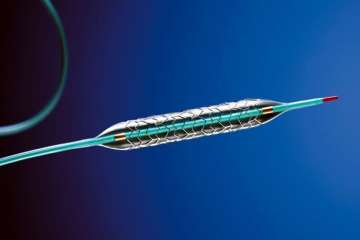The price of a stent may very well rise by 1000 per cent by the time it moves from the manufacturer to the patient, according to the data released by the National Pharmaceutical Pricing Authority (NPPA).
After a critical analysis of data submitted by stent companies, NPPA has worked out the margins at every level and the data shows that the margin on stents range from 270 per cent to about 1,000 per cent, reports Times of India.
Of all the players in the stent industry, the profit margins gained by the hospitals appear to be the highest, touching about 650 per cent, the report adds citing NPAA data.
The gigantic profit margin enjoyed by the hospitals is quite surprising as along with stent companies, it is hospitals and cardiologists who have been most vocal against price control for stents.
While the biggest disparity in price seems to happen at the level of hospitals, it is not necessary that all hospitals be charging that high a margin as it ranges from 11 per cent to 654 per cent.
According to the report, the manufacturing cost of a drug eluting stent (DES) for a domestic company is about Rs 8,000 and the price of an imported DES starts at about Rs 5,000. Combining of the data for DES along with biodegradable stents makes it difficult to get an exact idea of just how much the mark-up on DES alone could be. DES constitutes over 95 per cent of the stents used in India.
The NPPA data indicates that the importers or manufacturers charge the lowest margins compared to the margin of distributors (13 per cent to almost 200 per cent) and hospitals. However, it is well known that many companies operate the markets through their distributors.
In December last year, the Centre government had issued a key notification to impose price control on coronary stents and notified them as ‘scheduled-I drugs’ under the Drug Price Control Order.
The Department of Pharmaceuticals (DoP) had notified bare metal, drug eluting and biodegradable stents in Schedule-I of the country’s Drug Prices Control Order (DPCO) 2013.
The notification by the government came after citizens and patients’ rights group filed a petition in Delhi High Court seeking price control on stents.
The coronary stents are currently sold at highly inflated prices, keeping them out of reach of a large number of people requiring angioplasty and compelling many others who go for it to spend much more than their capacity.
The market is flooded with a diversity of stents, domestic and foreign-made, with price tags ranging from about Rs 25,000 to over Rs 2,00,000 per stent.
According to media reports, around 25 per cent of deaths in India is attributed to Cardiovascular disease (CVD) Coronary artery disease (CAD) is the commonest CVD accounting for 90-95 per cent of all CVD cases and deaths.
In India, only about 3 out of 1000 coronary heart disease needy patients are treated with angioplasty compared to 32 in the US, the reports said.
As per the National Interventional Council (NIC) Registry data in 2015 a total of 3,53,346 angioplasties were performed and 4,73,000 stents were implanted in India. Angioplasty is the procedure of placing stent in an artery.
Latest Business News
